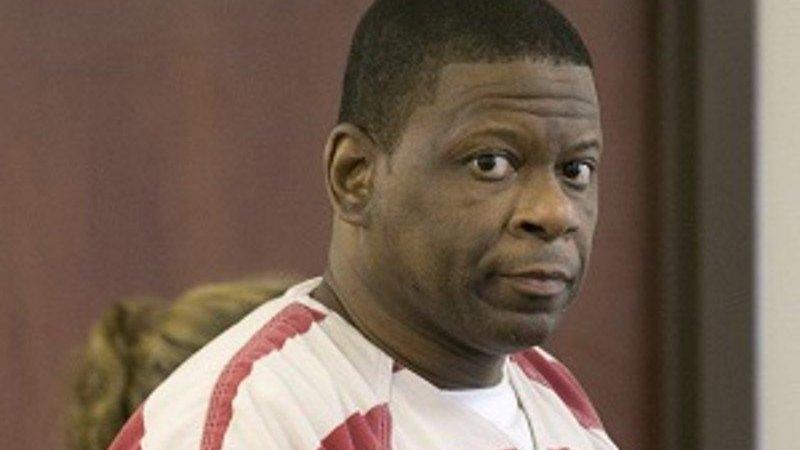New DNA Evidence Likely Exonerates a Texas Death Row Inmate. The Government Won't Test It.
Rodney Reed is set to die by lethal injection in less than two weeks.

Time is running out for Rodney Reed, a Texas man on death row who is scheduled to die on November 20. There are many reasons to doubt Reed's guilt, but the most glaring one is that several experts have concluded it's scientifically impossible. The state is set to execute Reed anyway.
Reed, who was convicted in 1998 for the murder of 19-year-old Stacey Stites, will be put to death by lethal injection in just under two weeks unless Texas Gov. Greg Abbott (R) intervenes. A group of bipartisan state legislators made their plea for a reprieve on Tuesday, asking for more time to review the mounting body of evidence that Reed did not kill Stites.
The Innocence Project, which is representing Reed, has reported on a litany of evidentiary and procedural problems that suggest Reed was convicted despite his innocence. Three forensic experts for the state filed formal affidavits explaining that the estimated time of death presented by prosecutors at trial was inaccurate, which "makes the timeline for Reed killing Stites implausible," the Innocence Project notes.
"The Texas Department of Public Safety (who employed the State's expert Karen Blakely), the Bode Cellmark Forensics Laboratory (who employed the State's retained expert Meghan Clement), and the State's forensic pathologist Dr. Roberto Bayardo, have all now acknowledged that the scientific opinions offered by the State to tie Mr. Reed to the murder were in error," Reed's 2018 appeal reads.
That appeal was denied.
"My estimate of time of death, again, was only an estimate, and should not have been used at trial as an accurate statement of when Ms. Stites died," wrote Bayardo in his affidavit. The pathologist originally approximated her death occurred at 3:30 a.m. on April 23, 1996. "If the prosecuting attorneys had advised me that they intended to use my time of death estimate as a scientifically reliable opinion of when Ms. Stites died, I would have advised them not to do so."
And that advisement may have turned the case on its head. Forensic pathologist Dr. Michael Baden, whose account has been bolstered by three other medical experts, testified in October 2017 that "to a reasonable degree of medical certainty, [Stites] was dead before midnight."
That's significant, as Stites' fiancé Jimmy Fennell said the two were together at home during that time. Fennell, who was sentenced to 10 years in prison for rape in 2007, has been the subject of growing suspicion in recent years. His former cellmate, Arthur Snow, submitted an affidavit on October 29 of this year in which he testified that Fennell confessed to the murder during a private conversation between the two. Stites was allegedly engaged in an affair with Reed, a black man, which incensed Fennell as he prepared for his impending marriage to Stites.
"I had to kill my nigger-loving fiancée," Snow claims Fennell told him. Reed and Stites' consensual sexual relationship has been corroborated by Stites' cousin, who submitted an affidavit in 2016 admitting that she knew of their relationship prior to her death. And Fennell, a former police officer, told a colleague about the affair as well.
The state's case always hinged on one piece of DNA evidence: Reed's semen, which was found inside Stites' body. No one came forward to confirm their relationship at trial, so prosecutors framed the evidence as an assault.
In that vein, there is new evidence available to the state for DNA testing, including Stites' clothing and the belt used to strangle her. (Half of the murder weapon was found next to Fennell's truck.) But the state won't test it, and the U.S. Supreme Court declined to take a closer look at the matter. Current precedent from the high court holds that defendants have no constitutional right to DNA testing, The Appeal notes, leaving people like Reed at the mercy of state courts or the prosecutors who have a vested interest in keeping them locked up—or worse.
As the clock nears the eleventh hour, a slew of media personalities, politicians, and celebrities—including Meek Mill, who has been affected by the criminal justice system himself—have urged Abbott to take a closer look at the case. And Reed isn't giving up hope.
"I don't feel beaten down," he tells NBC News. "I mean, I'm cautiously optimistic that something good has got to happen. I mean, I'm a believer. You know? I'm a believer."


Show Comments (42)